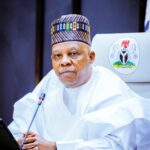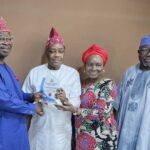By Felix Oladeji
In the last two decades, periodic elections had become the norm rather than an exception in West Africa – a region previously adjudged as the most coup-prone in the world. There had been notable progress with heads of states being elected, incumbents unseated, and alternations of power. Despite these positives, the enjoyment of dividends of democracy in the forms of public goods and services and rights continued to elude many residents. Instead, corruption and insecurity remained rife with scant respect for constitutionalism and the rule of law. In fact, some of these countries could be described as deliberative authoritarian states that use elections as a means of legitimizing themselves in office. The August 2020 military takeover in Mali brought to the fore the fragility of West African democracy.
Since that coup d’état in Mali, there has been an uptick in democratic backsliding in the region with coups in Guinea and Burkina Faso, a military-led succession in Chad, and an aborted coup in Guinea Bissau. This instability has been mainly driven by the leaders’ inability to govern effectively. When Alpha Condé became Guinea’s first democratically elected leader in 2010, his victory was widely heralded as the start of a new political era. However, by 2020 Condé became increasingly unpopular. His decision, along with economic missteps, set the stage for the military putsch.
- Swiss Huesler wins first ATP title in Sofia
- I criticise Buhari for failing to end killings in Benue — Ortom
The inability to effectively deal with prevailing insecurity is another regional challenge. In Mali and Burkina Faso, this created an increasing lack of trust in democracy as an effective system of government. In the months leading up to the coups in both countries, both governments had lost control of large swathes of territory to insurgents and jihadists. The state was no longer able to protect its citizens. This partly explains why citizens were seen on the street celebrating the ouster of the government in both countries.
Regional geopolitics is also shifting. The importance of France, the United States, and other European governments has dwindled in the region. The inability of the French military, G5 Sahel or Operation Takuba, to bring about improvements in the security situation in the sahel, driven in part by disinformation campaigns, has delegitimized western powers. Instead, Russia, China, Turkey, and other Gulf countries wield more influence as the go-to partners. These are states who support non-interference in the internal affairs of the country and whom African leaders believe offer them more respect. But importantly, they give arms, drive development and give unconditional aid.
At the regional level, ECOWAS is fast losing its reputation as a credible actor, and its legitimacy is increasingly in question. When Alpha Condé, Alassane Ouattara and Gnassingbe Eyadema committed constitutional coup d’états in Guinea, Côte d’Ivoire and Togo respectively, ECOWAS was notably silent. The ECOWAS response to coup d’état has been to slam sanctions on the country, including suspending them from the community. These sanctions are always ineffective save for the recent sanctions imposed on Mali, which included the suspension of non-essential financial transactions, closure of land and air borders, and the freezing of state assets, amongst others.
In Burkina Faso, the coup which toppled President Roch-Marc Kaboré in January 2022 was no surprise given prevailing security and political challenges. Large swathes of territory were occupied by armed terrorist groups and Kaboré’s government appeared unable to regain control or halt the continuous flow of displaced persons which reached 1.5 million people by the end of 2021. In Guinea, a tense political situation driven by, now deposed, former president Alpha Condé’s obsession with keeping power by changing the constitution and securing a third-term created popular discontent and the conditions for a military coup, led by Colonel Mamady Doumbouya, in September 2021.
Ultimately, its decisions and implementation power depend on member states political leadership; their interests; and capacity to enforce. The reality is that some of its heads of states can hardly be considered as model democratic actors and therefore lack moral authority to push for the restoration of democratic government. In 2020, Alpha Condé was not the only president who chose to change the fundamental law of his country in order to justify a third mandate which was legally disputed. President Alassane Ouattara did the same in Cote D’Ivoire before his re- elected for “the first mandate of a new Republic”.
Another challenge for the regional body has been the weakening of its ‘superpower’ state – Nigeria in the last decade or more. Nigeria accounts for 70 per cent of ECOWAS’s gross domestic product and more than half of its population. The political, economic and military capacities of Nigeria were key factors in ensuring ECOWAS legitimacy and influence in dealing with the complex and brutal civil wars and other armed conflicts in the Mano River region in the 1990s and early 2000s.
But the country is now mired in its own internal security crises and governance failures. If ECOWAS’s influence has declined dramatically over the past 15 years, it is primarily because Nigeria’s regional clout has weakened, and no other country or leader showed a strong interest in deepening regional integration in the community.
For ECOWAS to regain its relevance and address popular perceptions that it is weak, especially among those experiencing insecurity, violence and political instability, it needs to generate committed leadership among regional leaders such as Nigeria, Ghana, Cote D’Ivoire and Senegal. This can help create a body capable of ensuring stronger political and economic integration, that can in turn more effectively prevent crises and support the resolution of conflicts.
But it is also up to the citizens and activists of West African states to put pressure on the political authorities to do better when it comes to adhering to democracy and good governance principles. A regional community is not a substitute for collective actions at the national level, although it can reinforce them and transform good examples into regional standards and norms. Only with pressure from below will the “ECOWAS of peoples” commitment, be realised.
Oladeji wrote from Lagos
 Join Daily Trust WhatsApp Community For Quick Access To News and Happenings Around You.
Join Daily Trust WhatsApp Community For Quick Access To News and Happenings Around You.

